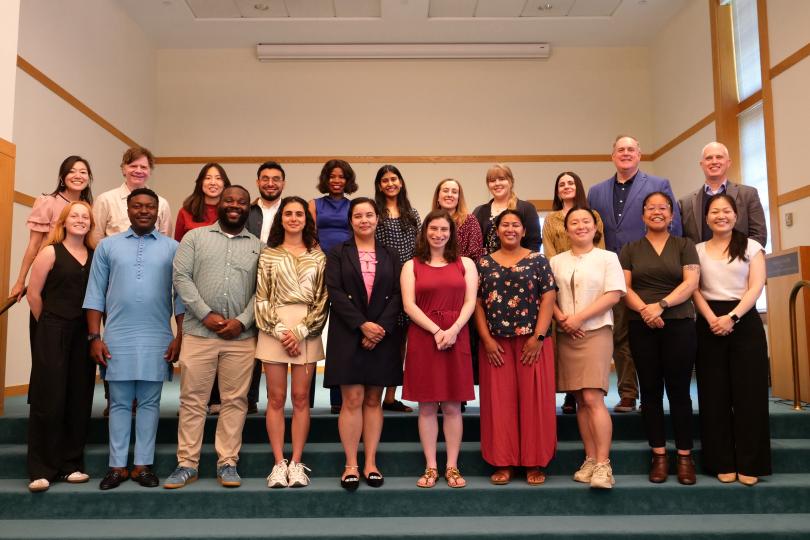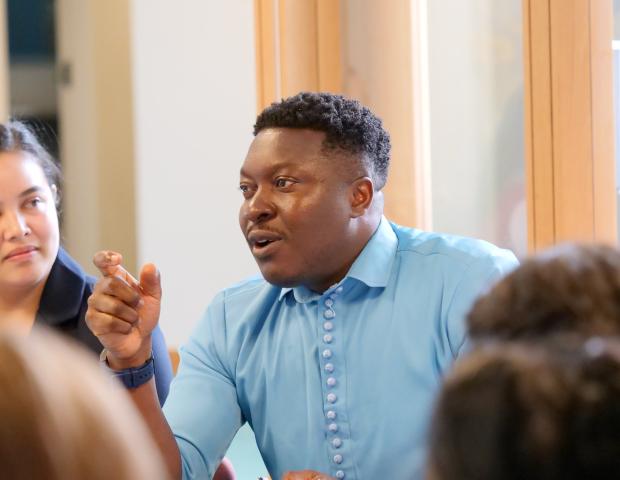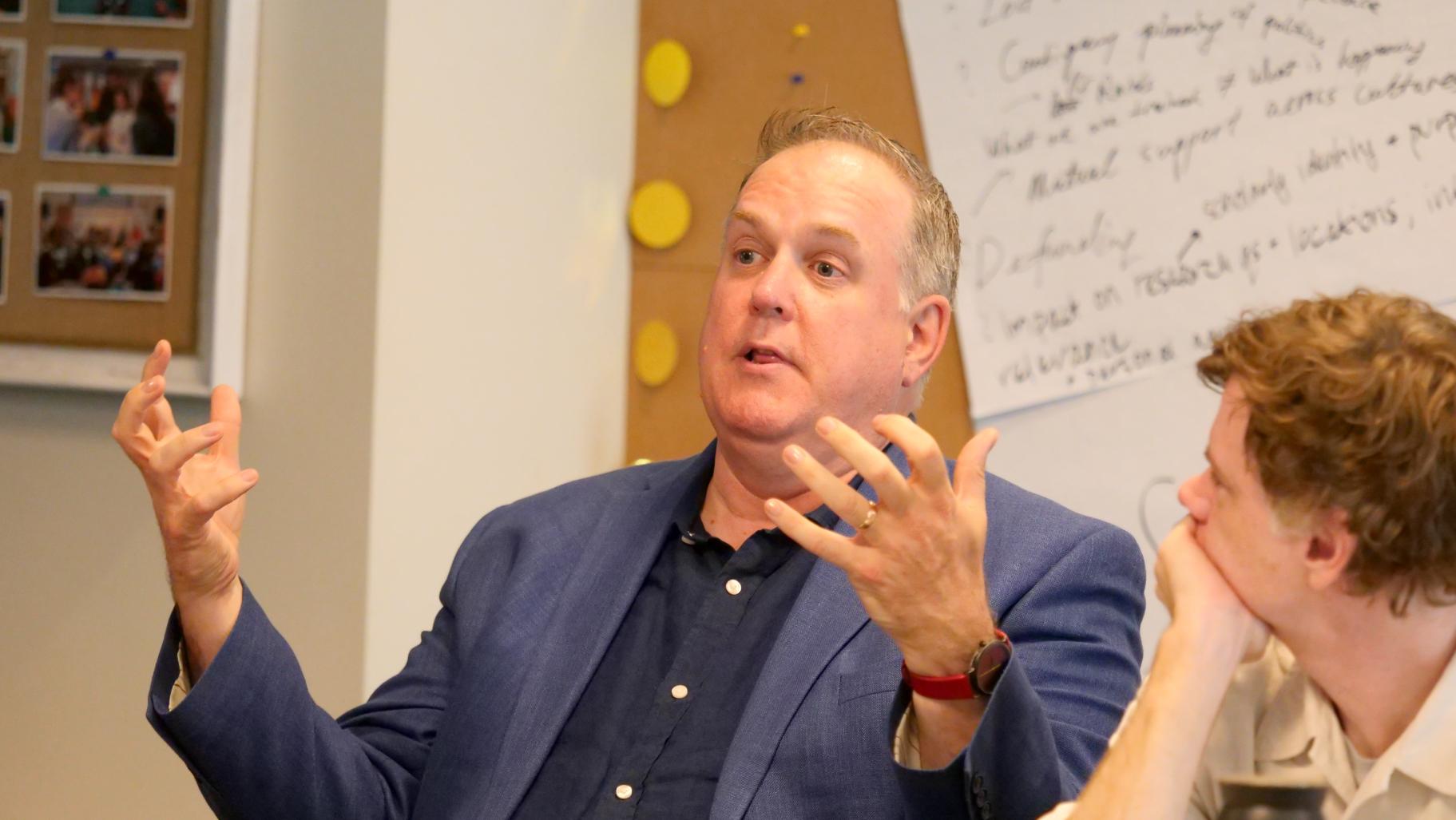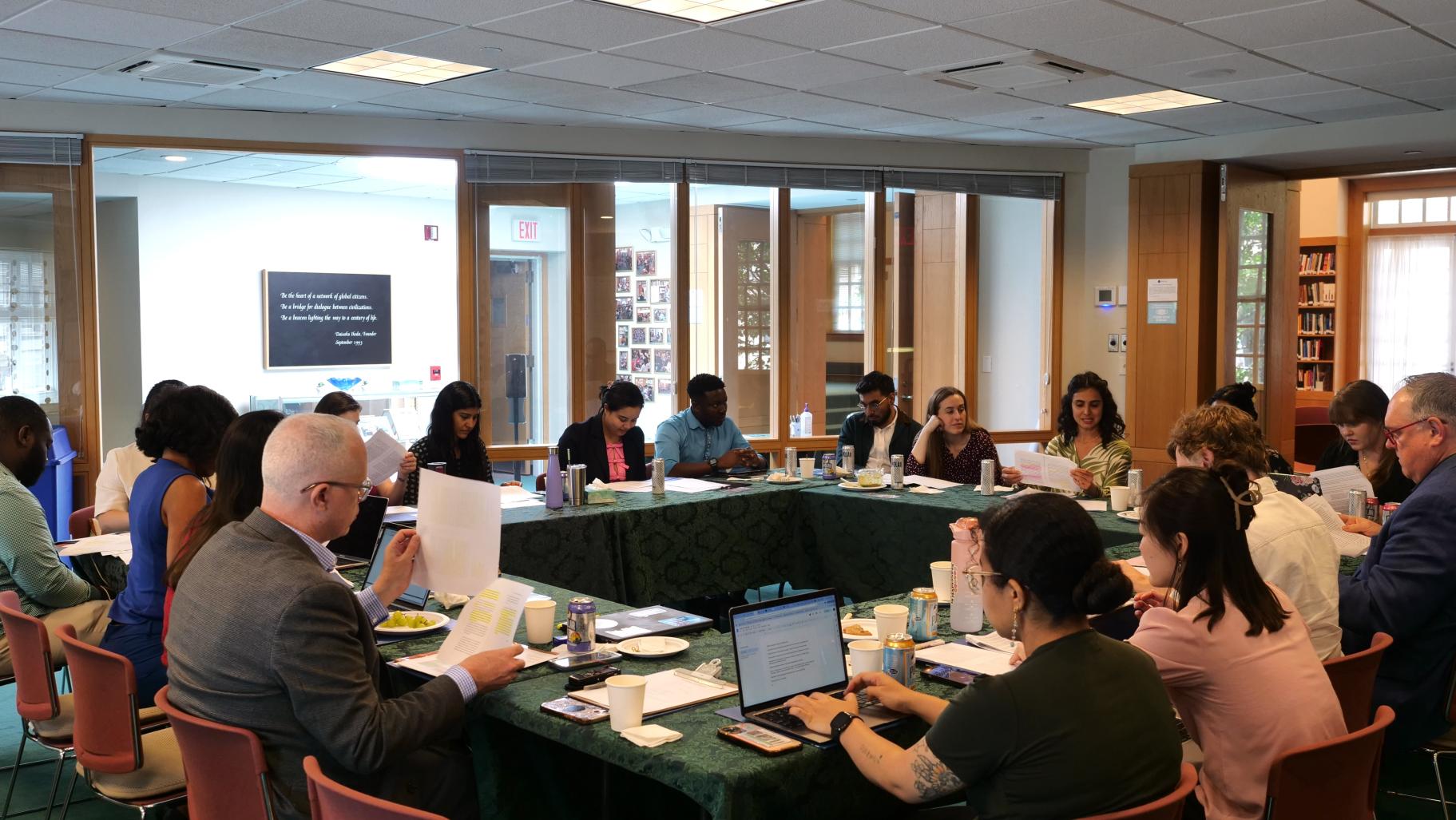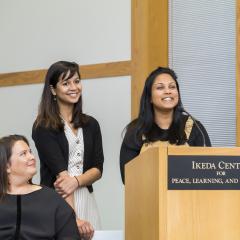The 2025 Global Citizens Seminar: Meditations on Hope
The 2025 iteration of the Ikeda Center’s annual Global Citizens Seminar featured the participation of fourteen doctoral students exploring two key themes from the work of Daisaku Ikeda – hope and the closely-related activity of value creation – in the context of their respective areas of research and social engagement. Though Ikeda’s conception of global citizenship doesn’t hinge on geography for its core meaning, it nevertheless was stimulating to have 9 countries of origin represented among the scholars: the United States, Nigeria, Zimbabwe, Colombia, China, Korea, Iran, India, and Brazil. Regardless of nationality, all the scholars indicated they are motivated to see how their personal experiences of growth can be connected to and inform important strands of personal and social development worldwide. The fourteen students also represented a variety of institutions including Brandeis University, DePaul University, Harvard University, and University of Massachusetts Boston.
By way of welcome, Center Executive Director Kevin Maher said that “I think for most of you, this is your first time at the Center. We’ve been eagerly looking forward to today, and we’re excited to begin what promises to be a thoughtful, timely, and inspiring conversation.” He also expressed his “heartfelt appreciation to our co-facilitators, Drs. Tim McCarthy and Jason Goulah, for bringing your vision, warmth, and collaborative spirit to the planning and facilitation of today’s session.” He also noted that when the co-facilitators and the Ikeda Center program team began planning for the seminar back in March, already a time of polarization in the US, “little did we know how much more tumultuous the following months would become.” Yet the planning sessions themselves became sites of solidarity and hope, he said.
In a way, said Maher, “this seminar series carries on the spirit of the Center’s earliest work.” Upon its founding in 1993, the Center hosted many “seminars like this,” he explained: “intimate gatherings brought together scholars from diverse disciplines and institutions to reflect on the ethical dimensions of global civil society.” And the theme of global citizenship has also been central to the Center’s mission from the start. It even forms one of the Center’s three mottoes bestowed by Mr. Ikeda: Be the heart of a network of global citizens. Of Mr. Ikeda’s vision, Maher said:
For him, global citizenship is far more than a theoretical ideal—it’s a lived commitment to recognizing our interdependence, responding to the suffering of others with compassion, and taking responsibility for the well-being of our shared world. In his peace proposals, messages to the Center, and university lectures, he consistently called on us to recognize our shared humanity and to work across differences through empathy, understanding, and solidarity.
At its core, said Maher, Ikeda believes that the path beyond endless conflict depends on, in his words, “a fundamental transformation within our own lives, so that we are able to perceive our intimate connection with all our fellow human beings and feel their sufferings as our own.” This transformation is fostered above all by the practice of dialogue and an essential orientation toward hope. Above all, Ikeda contends that “we must restore and renew our faith in humanity and in each other. We must never lose sight of the fact that we can still make the twenty-first century an era free from the flames of war and violence – an era in which all people may live in peace.” It is in this spirit that the Ikeda Center gathers scholars each year for the Global Citizens Seminar.
Bringing Your Full Self to Research and Citizenship
To open the day’s first session, co-facilitators Jason Goulah and Tim McCarthy offered some framing thoughts for the dialogues to come. Dr. Goulah is Professor of Bilingual-Bicultural Education and Director of the Institute for Daisaku Ikeda Studies in Education at DePaul University in Chicago. And Dr. McCarthy holds a number of positions at the Harvard Graduate School of Education, including serving as core faculty in the Equity and Opportunity Foundations Curriculum. Among other positions at Harvard University, Dr. McCarthy is faculty chair of the Global LGBTQI+ Human Rights Program at the Carr Center for Human Rights. Speaking first, Goulah welcomed the gathered scholars, calling them a “superhero kind of collection of people, each with their own special powers.” There is no need to wonder, he said, as so many doctoral students do, whether you belong or have anything important to contribute to the conversation, since you clearly do. With the “current moment” of social and political strife and conflict, observed Goulah, is that what is too often missing is something that is vital to Daisaku Ikeda. What we have lost is “the capacity to engage in true life to life, heart to heart, person to person dialogue, where you really can open up your own life and seek to penetrate the heart of that one person that you’re talking to in that moment.” For Ikeda, when you “bring your full self, everything you have,” to dialogical encounters with others, “something is created in that unique space that will never be and could never be created anywhere else.” This vision is especially important coming from Ikeda, who like other theorists of dialogue like Paulo Freire and Mikhail Bakhtin, came of age in an “autocratic,” “oppressive,” “monologic” environment. So to see dialogue as a way of transcending what was expected and required of you is an important step. For this same reason, for Ikeda, hope is something that is simultaneously “light” and “joyful” and “serious” and “aspirational.” Ultimately, said Goulah, Ikeda sees as our core task that of “human education,” that is, to become “richly human” in value-creating ways. This seminar is part of that same endeavor.
Dr. McCarthy opened by picking up on Goulah’s remarks on what is known as the imposter syndrome. “If I had a dollar for every one of my students who said they didn’t think they belonged here, I could have retired yesterday and I could pay off my mortgage,” he joked. In all seriousness, though, he said that what happens at the Ikeda Center provides an “antidote to the most toxic things” that happen at our high-pressure universities. What he meant was that, at the Center, scholars are encouraged to be, as Goulah suggested, fully human, which means, among other things that it’s okay to be “messy.” This truth also holds for his work as an historian, he added, where he looks at “the muck and the mire and the mess of the past and [tries] to figure it out in a way that helps people understand how we got here, where we are, and where we can go.” For this reason, he chose the abolitionist movement for his doctoral studies, he said. That and because his parents raised him to be an activist. In essence, the core question that guides him, he said, feels relevant to the Global Citizens Seminar. “How can you be a scholar, and then also a teacher, and then also a citizen? And there’s no easy answer to that. And my whole life has been the urgent and ongoing search for the answer to that question.” But it’s in rooms like this, he added, “where I feel like I’ve got a shot at getting closer to that and that we’ve got a shot at getting closer to that.”
Then, introducing the day, McCarthy said that they would like to begin with each participant sharing some of their personal stories, or what might be called “your origin or evolution story,” something to help everyone “understand a little bit more about who you are and how you got here.” After that, everyone will break into groups of four for “disruption/reflections sessions, digging deeper into questions such as “What are you grappling with right now?” and “What are the opportunities that this current moment presents us with?” After a whole group discussion on findings from these small group dialogues, the day will conclude, he said, with a brainstorming session on ways the whole group might collaborate on a project together, for example, writing a special issue of a major education journal.
Personal Journeys and Current Questions
It has become a seminar tradition to devote a whole session to each participant telling their stories of how their personal experiences have informed and blended with their academic pursuits, leading them to be the person sitting at this table today. Though individuals hailed from many different locales, certain similarities emerged among their formative experiences. One core theme was that many people have been inspired to help others because of crises they or family members have personally experienced. For example, one participant’s father had been a political prisoner in Iran before her birth, causing her to think about the implications that existing in “long-term survival mode” has for the health of families and societies. Among the attendees were two scholars hailing from Nigeria. Both had experiences with displaced people as children, with implications for both of their work and studies as adults. One is looking at the impacts of extremism on global security and the need for mediation practices and the other is working with disaster relief programs globally, along with having founded a nonprofit for tech education at home in Nigeria. Other scholars were addressing such structural issues as poverty and freshwater access. One unique angle on global citizenship education was introduced when a scholar from Colombia spoke of how his experience being raised in a deeply political family in which friends and family of all ages would engage in serious and stimulating conversation has inspired him to look at how children develop their understandings of the political world. Wrapping up this session, Dr. McCarthy said that he discerned many shared themes across the diverse experiences, such as dreaming, losing, and persisting.
The scholars then broke into four small groups to discuss prompts such as: Given the path that led you here, what are you grappling with right now? What does it mean to ground ourselves in a disruptive world? What are the opportunities that this current moment presents us with? Or, as Dr. Goulah encouraged: What would it mean to see this as a major value-creating moment? During the small group conversations participants recorded responses on easel pads meant to inform the rest of the day’s full group dialogues. Among several points, Group One picked up on the spirit of the introductory session, asking: How do our backgrounds and subjective experiences lead us to use education as a mechanism for hope? They also discussed how our current moment encourages us to choose hope and think carefully about how best to use hope. Group Two discussed ways to cultivate hope in “difficult” times. Some ideas included cultivating it in one’s personal life, being aware of privilege and the possibility of a “hope imbalance” in which hope is difficult to sustain for some, and, thirdly, always emphasizing the role of agency and how we can “manifest” hope into existence. Group Three engaged directly with the anxieties of being an international student at a time when that status or opportunity is under threat. How, they wondered, can I adapt to changes and still stick to my values? How can I maintain my scholarly identity and purpose? Perhaps, they also wondered, if we should be “grateful for the eruption,” and that fact that the “genie is out of the bottle” in terms of political issues, with people’s opinions not so much being “new” right now but rather being brought to light because of the current political climate. Group Four focused on the question of how to maintain balance despite “the changing political environment” and all “the chaos in the world.” A core part of the challenge is each person’s need to keep up with “daily responsibilities.”
Afternoon Dialogue: The Many Dimensions of Hope
For this year’s seminar, the co-facilitators selected two writings from Daisaku Ikeda as grounding texts: 1) his 2014 peace proposal, “Value Creation for Global Change: Building Resilient and Sustainable Societies,” and 2) his essay “The Most Important Decision” from the collection Hope Is a Decision. During lunch, participants paired up to informally talk about any passages from the two readings that resonated with them. After lunch, the seminar proceeded to the main dialogue session of the day. Before launching into the discussion, McCarthy shared some “guideposts” based on his many years’ experience leading group conversations. In essence, he recommends the approach of “step up, step back, share the mic.” This is “so that none of us is talking too long or too much. And then the other thing is, I always feel like classrooms become communities when people start to build in some way on each other’s insights and knowledge.” True to that spirit, a great number of topics were addressed and built upon during the two-hour dialogue. Here are several that bring out the many dimensions of hope as a philosophy and practice.
Hope and Realism
Early in the session, Golaleh Yazdani of DePaul University highlighted what was for her a significant quote from Ikeda’s “The Most Important Decision” essay. In it, he wrote that “Hope that has not been tested is nothing more than a fragile dream. Hope begins from this challenge, this effort to strive toward an ideal, however distant it may seem.” This quote resonated with her since it spoke to a recent conversation she had with her brother who is “back home in Iran.” In an effort to be “realistic” with him she painted a worst-case scenario of what could happen there, but he stopped her and said, “well, I’m trying to be hopeful here. Both realistic and hopeful.” Lilian Sibanda of UMass Boston, who hails from Zimbabwe, underscored Yazdani’s comments with Ikeda’s statement that Nichiren, the founder of the Buddhism practiced by Ikeda, “advocated a way of life in which people confront painful realities, identify root causes and seek means of resolution.” Thus, while we may experience a tension between hope and realism, from Ikeda’s perspective being rooted in reality is the source of hope.
Reasons to Choose Hope
When reality is challenging for many, it is good to talk about reasons why choosing hope is wise. Phil Eke-Okocha, born in Nigeria and now studying at UMass Boston, laid out a unique and compelling argument. “If we relinquish hope and are paralyzed by helplessness, we not only allow the problems to persist, but can contribute to the proliferation of similar problems elsewhere.” And if “these people who have endured this hardship” experience “personal gain” when overcoming it, “it’s not for their personal interest, but wanting better for others.” It is in the spirit of “I went through this thing; I don’t want you to go through it as well.” Goulah observed that on the deepest level, for Nichiren Buddhists such as Ikeda, “people are born to be happy,” and hope is one of the best value-creating stances for increasing happiness. Sibanda noted that hope implies that there is some level of dissatisfaction, and that transcending or changing that circumstance is possible, and a necessary first step in growth.
Where Does Hope Reside?
As the conversation developed, Dr. McCarthy voiced a question that helped to focus the conversation. Where, he wondered, does hope reside? Jiedine Phanbuh, also of UMass Boston, observed that for each person seated here, their research represents “hope-in-action,” a faith that their findings and proposed solutions will make a positive difference in the world. Dr. Goulah explained that for Ikeda hope resides in knowing that we are “never at the whimsy of the universe,” and that even though “all phenomena are interdependent across time and space,” we have “incredible agency.” Augustine Aboh, now studying at UMass Boston, pointed to a key quote from Ikeda’s peace proposal that illuminated the relationship of the inner change of self and the hope of social transformation. “As such,” writes Ikeda, “the true significance of human revolution is not realized while it remains confined to a change in the inner life. Rather the courage and hope that arise from this inner change must enable people to face a breakthrough, even the most intractable realities, a process of value creation that ultimately transforms society.” In response to Dr. McCarty’s observation that for Victor Frankl hope resided outside of the walls of the concentration camp where he was imprisoned and for Nelson Mandela it resided within the walls of the prison where he was held, Alysha Banerji of Harvard University said we can also see a similar dynamic when we ask whether hope resides in the possible or the impossible. Zora Haque, also of Harvard University, offered a long-term perspective highly consistent with Daisaku Ikeda’s worldview, when she said that as an educator, she feels an obligation to nurture hope in “the younger generations.” If they “don’t have hope,” she asked, “what is going to happen?”
Keeping Hope Alive
Another through-line dealt with the challenge of keeping hope alive in difficult times, including our present moment which is testing the future of so many different people. In fact, Dr. McCarthy confided that there is “a deep hopelessness and powerlessness that I’m feeling most acutely for the first time in my life.” Manning Zhang of Brandeis University shared an interesting perspective on this challenge by noting that many elders in her native China have learned to derive “small but concrete” happiness and hope in everyday developments such as the price of eggs. Expanding on this observation, Minjin Chae, born in Seoul, South Korea and now of Harvard University, talked about the need to maintain awareness of “the small things that I can control as an individual” and “the so many things out there” beyond her control. This means that for her to be effective as a scholar concerned with global citizenship, she needs to be “grounded” in “personal things.” Here, Sibanda reflected on her experience as a single mother who has also dealt with poverty. I would ask myself, she said, “how much room to move do I actually have? What are my options? And then from what is possible from that place, you take that first step of, okay, I’m gonna do this. And then after that small step, you take the next step and then before you know it, you are five steps away from that problem.”
The Centrality of Value Creation
As another focusing question, Emma Lezberg of the Harvard Graduate School of Education asked: “Do we need some kind of substantive definition of hope that is toward a particular end in order for us to call it that?” Yazdani noted that the value-creating Soka perspective, established by Makiguchi and advocated by Ikeda, all actions can be judged in terms of beauty, gain, and good. She illustrated using today’s dialogue as a model. Let’s say we’re interacting, she proposed, “but I’m attacking you verbally, so this doesn’t have any beauty in it. And then we’re talking about gain, like are we growing together in this dialogue? And when it comes to good, we ask: Is anybody else growing through our dialogue?” Goulah mentioned that one reason value creation is such a resonant concept or principle for Ikeda is because of all the destruction and loss he experienced growing up in wartime Japan. A positive, creative orientation is vital to him. Goulah also observed that in the Soka worldview, “just because I say it’s good doesn’t mean you have to suddenly think it’s good. And so, and I think in that sense, value creation is inherently dialogic.” Given that, responded McCarthy, we do well to acknowledge that if hope to one person is different than hope to another, then that is something we need to consciously “wrestle with.” Izabella Jablonski-Lawson of DePaul University offered a complement to this notion, saying that the one thing we need to agree on is that negativity cannot be the basis of any hope-oriented dialogue, but beyond that “there is no way of controlling where a dialogue is going to go.” Along these lines, Nicolas Medelius, a native of Colombia who is studying at the Harvard Graduate School of Education, said that what he hopes we can avoid is a “monopoly of hope” in which one person’s hope does not allow for the hope of another.
Faith in People’s Capacity for Good
Toward the end of the dialogue session, Banerji raised a point that gets to the heart of hope-based, value-creating education when she said that “I think educators need to believe that people are fundamentally good. I don’t think you can be in a classroom if you think that people are bad. So I’ve had that sense, but I also realize that I don’t always carry that belief into my personal life in terms of how I exist in the world.” Adding context, Phanbuh said that most of us “don’t have faith in certain people,” for example if they are on the “right or left,” but this means that we each should make the “consistent effort to cultivate this goodness in ourselves as we look at others.” Kevin Maher noted here that for Daisaku Ikeda, “all human beings have the inherent capacity for good. That they all have this inherent dignity or what he calls a Buddha nature, which is unlimited compassion, courage, empathy.” Speculating on the importance of the educator’s faith in our potential for good, a faith he shares, Dr. McCarthy wondered if this is “why we pour so much of ourselves into our pedagogical” efforts.
In addition to these core themes, many other topics were discussed during the whole group dialogue session. For example, Siobhan Greatorex-Voith, a doctoral candidate at Harvard University, discussed ways that our current macro-system of competition-based capitalism, with its ingrained power imbalances, appears to her to be designed to discourage the sort of dialogue across differences that would encourage hope among people. Given this, when we choose hope it becomes an act of necessary resistance. And, speaking to some degree for everyone, Fernanda Artimos de Oliviera, a native of Brazil now studying at Brandeis University, shared that moving to the United States to pursue her studies has been an act of hope for her, and though she struggles at times, she consciously acts to keep her faith alive.
Conclusion: Reigniting Hope
After the main dialogue session, the group discussed possibilities for engaging in a project to continue the sense of community and to make a contribution to the wider discourse. The core idea would be for the scholars to collaborate to produce a special issue of a prominent academic journal on themes that emerged during today’s discussion. Then, Ikeda Center staff and the facilitators of the event offered some concluding thoughts. First, the day’s moderator, Center Senior Program Manager Lillian Koizumi, thanked everyone for their contributions and cited a passage from Mr. Ikeda’s peace proposal that captured the spirit of the event. In it, he references Nelson Mandela’s conviction that “the abolition of apartheid was not something that he accomplished on his own,” she said. Rather, it was “a culmination of the determined efforts of countless individuals.” And today, added Koizumi, I really sensed that dynamic “here in this room.”
Speaking next, co-facilitator McCarthy said that when he encounters the work of people like Ikeda and Nelson Mandela and all the others “we’ve cited here in our conversation” he comes away with questions of who we are, who we will become, and how best to spend our time in the world. He also confessed that his “ledger of hope and despair” has wavered over the last year, “but today especially helped to push the needle more in the direction of [hope].” The other facilitator, Jason Goulah, said that “I think the Center is engaged in work for no reason other than to bring people together to do good. To bring out the best in themselves and to somehow contribute to the betterment of humanity. It really begins and ends with that.” He added that today he gained a lot in that regard and hopes that each of you had a special experience reflecting the spirit of the Center. Finally, Kevin Maher said that even though so many of us are new to one another, “I think of this as a gathering of friends.” He added that “when we were thinking about possible outcomes” for the day, today “exceeded our expectations, by far,” truly “reigniting the flame of hope.” He said he sensed this from the very start of the day, when everyone shared their “genesis stories.” To conclude, he quoted from an interview with the social historian Vincent Harding, a friend and advisor to Martin Luther King, Jr., on the hope he derives from being and working with young people.
Even in the midst of all the difficulties they face being young in America today, I see great possibilities in them. As long as the capacity to see new possibilities exists, then there can be hope. Because, as you know, we come to new situations politically and economically and socially only insofar as people are willing to dream them first, and young people still have the capacity to dream. I find that a source of hope.
